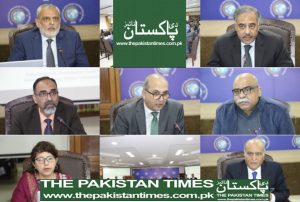ISSI hosts forum on “ Pakistan’s Space Policy Tapping into the Space Implicit ”

The Arms Control and Disarmament Centre( ACDC) at the Institute of Strategic Studies Islamabad( ISSI) hosted a forum entitled “ Pakistan’s Space Policy Tapping into the Space Implicit ” on February 29, 2024.Maj.Gen.( R) Amer Nadeem, former Chairman of Pakistan Space & Upper Atmosphere Research Commission( SUPARCO), delivered the keynote address. prestigious discussants from academia and suppose- tanks presented their perspectives. The forum handed precious perceptivity into Pakistan’s National Space Policy( NSP) and its space eventuality to accelerate socio- profitable development. The crucial challenges, as well as options available for Pakistan, were bandied. Gen.( R) Amer Nadeem, in his keynote address, stressed the significance of transnational collaboration and emphasized its part in reducing costs and time in space operations. He supported for strategic hookups to influence moxie and coffers from other nations, enabling Pakistan to advance its space capabilities more efficiently. Looking ahead, he outlined the National Space Program( NSP) 2047, emphasizing its realistic approach acclimatized to Pakistan’s current technological geography. He stressed the necessity for strict prioritization of technologies that align with the country’s immediate requirements and capabilities. He expressed sanguinity about Pakistan’s space program, citing the government’s loyal commitment and determination as crucial motorists of progress. He stressed the need to emphasize the nonsupervisory sector and the public-private hookups. He suggested that joining indigenous platforms will also help Pakistan develop its space program. He emphasized that with uninterrupted support and power, Pakistan is poised to achieve significant mileposts in space disquisition. In his welcome reflections, DG ISSI Ambassador Sohail Mahmood underlined the salience of Pakistan’s first- ever Space Policy, emphasizing that it handed a comprehensive frame for the unborn development of the space sector in line with arising global trends and feeding to Pakistan’s pivotal public requirements. Noting the vital part of space technology in ultramodern societies, he underlined the imperative for Pakistan to harness the space technology’s eventuality for socio- profitable development and security. He refocused out that Pakistan’s incursion into space transcends satellite launches, visioning a future where space technology energies progress, invention, and global competitiveness. Ambassador Sohail Mahmood expressed sanguinity regarding the NSP, foreknowing it as a catalyst for advancing technology- driven results to experimental challenges. He stressed the policy’s part in easing the effective application of space technologies and operations to promote public pretensions while emphasizing the government’s commitment to tone- adequacy in space wisdom and technology. before, Malik Qasim Mustafa, Director ACDC, in his introductory reflections stated that moment, the world has entered a new or alternate space age and major powers are involved in a space race. They’re investing huge coffers to develop and contemporize their space programs with binary- use capabilities. Pakistan is conscious of these developments and attaches great significance to exploration and development work in the field of space wisdom, technology, and its operations for peaceful purposes and the socio- profitable uplift of the country. He stressed that Pakistan’s NSP revolves around a vision to “ exploit space wisdom and technology to ameliorate quality of life of people of Pakistan while securing public interest and sovereignty. ” Ghazala Yasmin Jalil, Research Fellow at ACDC, ISSI, handed an overview of Pakistan’s Space Program. In her donation, she underlined that NSP is a step in the right direction and aims to attack numerous challenges the space programme faces. Commitment by the government and all applicable stakeholders is vital, public public-private cooperation is important in amping the country’s space programme. She underscored that an effective space programme isn’t an option but a necessity- being an machine for profitable growth and socio- profitable development moment. Ali Sarosh, Associate Professor, Air University Islamabad, talking about “ Space Technology for Sustainable Development in Pakistan ” emphasized the pivotal part of space technology in fostering sustainable development and outlined crucial considerations for the NSP to contribute to this objective effectively. pressing the global agreement on the significance of space technology for sustainable development, he underlined the commitments made by the transnational community in this regard. He stressed the need for the NSP to align with the SDGs outlined in Agenda 2030, emphasizing that the policy must address all 17 SDGs and influence technology to achieve them. He linked four essential aspects that any space policy must encompass a strategic vision, a description of strategic constraints, realistic and well- defined pretensions, and an evolutionary medium. Adil Sultan, Dean FASS, Air University Islamabad, delivered his reflections on “ Pakistan Space Policy The Way Forward ” and emphasized the necessity for Pakistan to realign its space policy, championing for a strategic shift from geopolitics to Astro politics. He underlined the critical significance of clarity and a well- defined roadmap to advance the nation’s space objects. He stressed the urgency for Pakistan to prioritize marketable space technology, reducing reliance on foreign backing for satellite launches, and fostering indigenous capabilities. He called for establishing robust think- tanks and academic institutions devoted to space technology. In his concluding reflections, Ambassador Khalid Mahmood, Chairman BoG, ISSI, underlined that space technology is a new frontier that’s vital to socio- profitable development. He confided Pakistan’s trip into space, marked by determination, creativity, and a loyal commitment to employing the vast eventuality beyond the Earth’s atmosphere. He emphasized that investment in exploration and development, capacity- structure, and nurturing a new generation of scientists and masterminds were pivotal rudiments for remaining at the van of space disquisition. The forum was attended by noted academics, area experts, scientists, suppose- tank representatives, interpreters, and members of the politic fraternity.
Sub-Editor: Arslan